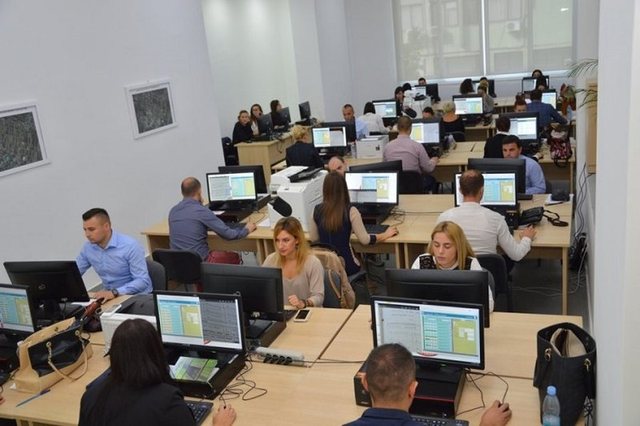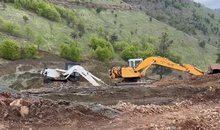

16% of Albanian employees work less than 10 hours a week, much more than the region, according to a recently published European Training Fund study.
Data shows that a large portion of workers in the country are underemployed and the income they provide is completely insufficient (see chart below).
The survey notes that most employees in the Balkans have regular work schedules, mostly between 30 and 49 hours per week. However, 8% of employees in North Macedonia and 14% in Albania and Kosovo work more than 50 hours per week.
As the data shows, Albania has two extremes with a quarter of employees working only 2 hours a day, while 14% of employees work more than 50 hours a week, among the highest regional levels.
Employees working in agriculture, construction, and tourism stay on the job longer.
Also, around a third of workers in the Western Balkans are exposed to workplace hazards, such as inadequate conditions and equipment. Bosnia leads the region for the high percentage of workers with inadequate conditions (34%) followed by Serbia (33%), Albania (29%) and North Macedonia (28%).
The survey noted that an increasingly large portion of employees work away from their place of residence and this trend is growing.
Bosnia and Albania have the highest percentage of employees working away from home (36%), Albania 33% and Kosovo the lowest 21%.
Employees with higher education are most likely to benefit from remote work, but this group also includes manual workers in the construction and agricultural sectors.
The ETF survey of around 1,000 employees in Albania showed that the prevalence of informal employment is high in Balkan countries and especially in Albania.
The percentage of workers without a contract ranged from 20% in Albania to 6% in Serbia, while it was only 2% in the EU. This situation is particularly worrying as it leaves a significant part of the workforce in precarious employment.
The labor market in our country has multiple problems related to high informality, low wages, and mismatch of skills with labor market needs./MONITOR
Latest news



How did LaCivita change the DP campaign? Berisha: He studied the opponent
2025-05-08 22:49:51

David defeats Goliath
2025-05-08 22:15:50

Journalist: There are SPAK infiltrators in party headquarters
2025-05-08 21:55:15
Who is the new Pope?
2025-05-08 21:48:13
Berisha finally reveals when he will retire from politics
2025-05-08 21:33:46


LaCivita in Lezha: Albanians will fire Edi Rama from his job
2025-05-08 21:11:20


Berisha: LaCivita chose us because he believes in Reagan's program
2025-05-08 20:48:40
He rejected America to serve Pogradec, Genti Çela tells about life in "Elevate"
2025-05-08 20:26:28




Pope Leo XIV greets the faithful for the first time in St. Peter's Square
2025-05-08 19:29:33




Photo session with LaCivitta in Tirana: For Great Albania
2025-05-08 18:40:18
Source: DASH decision a personal victory for Berisha
2025-05-08 18:30:10
Take off those crazy glasses and see where you've taken him?
2025-05-08 18:02:47
LDK files criminal charges against members of the incumbent Government
2025-05-08 18:02:00







BIRN analysis: Tirana, the determining district for the future majority
2025-05-08 16:04:03




Chris LaCivita's contract with the DP, Berisha: 100% correct and clean
2025-05-08 15:11:11

"These are the peak days", Berisha reveals when he will travel to the USA
2025-05-08 14:45:25


Endless boxes with filled-in ballots, DP demands separation of votes from Greece
2025-05-08 14:11:12


Photo/ Who are the 3 associates of Talo Çela arrested in Dubai?
2025-05-08 13:37:09

Hetimi për krimet zgjedhore, Altin Dumani zbarkon në Prokurorinë e Shkodrës
2025-05-08 13:06:21
DASH paves the way for Berisha, Alizoti: Great news on the eve of Great Albania!
2025-05-08 13:03:48

"Freedom works", DP welcomes the US position
2025-05-08 12:48:07

Black smoke rises from the Sistine Chapel, the Vatican still without a Pope
2025-05-08 12:26:18





Davide Pecorrelli extradited to Albania
2025-05-08 11:29:04
'May 11, Albania will react', Xhaferri: Electoral criminals will pay
2025-05-08 11:21:46

Gjin Gjoni: Non Grata fell, Rama should get ready to go to McGonigal
2025-05-08 11:01:54
May 8th deadline for immigrants to vote in Greece extended by one day
2025-05-08 10:48:42
Collapse of massive chrome structure, still no trace of 29-year-old
2025-05-08 10:40:04
Vehicle bursts into flames in Paris Commune
2025-05-08 10:25:43
He gave land to his father and cousin, Basir Çollaku denounces the SP candidate
2025-05-08 10:16:16




Electoral Crimes/ BKH agents and Police conduct checks in Shkodra
2025-05-08 09:19:13
3 associates of Talo Çela arrested in Dubai
2025-05-08 09:02:28
Mouse in the owl's claws, Chris LaCivita responds directly to Rama
2025-05-08 08:45:40
Foreign exchange, how much foreign currencies are sold and bought today
2025-05-08 08:30:38
BIRN: Organized crime, the 'invisible party' of the Durrës elections
2025-05-08 08:26:35
Horoscope, what do the stars have in store for you today?
2025-05-08 08:08:15
Cloudy and rainy, what the weather is expected to be like throughout the day
2025-05-08 07:52:13
Posta e mëngjesit/ Me 2 rreshta: Çfarë pati rëndësi dje në Shqipëri
2025-05-08 07:40:16


Rama attacks Bardhi: Fier cannot be represented by the world's gas
2025-05-07 22:36:22



EU calls on Israel to lift humanitarian blockade in Gaza
2025-05-07 21:42:34
"Russia is "asking for a lot"! Vance calls for direct Moscow-Kiev talks
2025-05-07 21:20:16





Bank of Albania sets limits on home loans, Sejko: The maximum will be 85%
2025-05-07 20:16:10


EP calls for immediate lifting of measures against Kosovo
2025-05-07 19:39:58
